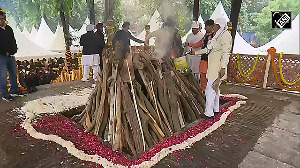 In a move that could affect India's handicraft exports to developed countries, about 3,000 small scrap dealers, mainly from the unorganised sector, are facing a closure threat to their units because of stricter environment norms. Closure of these units may affect supply of secondary metal, mainly used as raw material for handicraft and cottage industries.
In a move that could affect India's handicraft exports to developed countries, about 3,000 small scrap dealers, mainly from the unorganised sector, are facing a closure threat to their units because of stricter environment norms. Closure of these units may affect supply of secondary metal, mainly used as raw material for handicraft and cottage industries.
In July, the Union ministry of environment and forests tightened scrap trade norms and restricted import through only processing units. Through this, the government barred over 5,000 scrap dealers from import.
The norm was later liberalised and traders were allowed to import metal scrap only, with proper record of supply to processing units. About 40 per cent of copper and aluminium consumed in India is secondary, as it is made by re-processing scrap.
Now, with this norm, about 30 per cent of the existing scrap dealers sourcing raw material for secondary smelters are struggling to continue. These unorganised sector dealers have been trading in scrap for years and supplying to processing units either directly or through a middlemen (local trader of remote processing zones).
On October 1, the MEF issued a notification restricting import of metal scrap to only registered traders. Through this, the government asked scrap importers to provide all details of scrap sales to processing units, which is a herculean task, said Surendra Mardia, President of Bombay Metal Exchange.
India imports approximately 1.5 million tonnes of metal scrap to meet the requirements of small industries. Currently, the scrap melting industry is operating at 20-25 per cent of its capacity, due to low availability of raw material. The government had suspended scrap imports, saying re-processing of the metal discharges harmful gases, affecting the environment.
The government has asked the industry to install pollution control machinery like dust collectors and adopt adequate precautions in warehouse storages. This may cost a company Rs 15-20 lakh (Rs 1.5 to Rs 2 million). The investment of such a huge amount is difficult for a company generating an annual revenue less than Rs 1 crore (Rs 10 million). Therefore, they will have no option but to opt for another small business, said Mardia.
Brass would become costlier in case raw copper and zinc were used due to the price differential of 25-30 per cent for their raw and scrap varieties. If raw metals used, the product cost will be higher by Rs 30-35 a kg. This will make the domestic industry yield space to other countries for handicraft exports, goes the argument.







 © 2024 Rediff.com -
© 2024 Rediff.com -